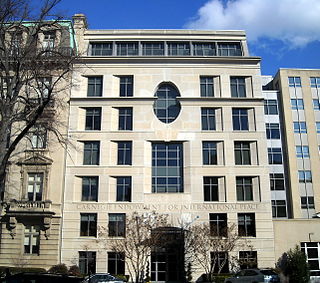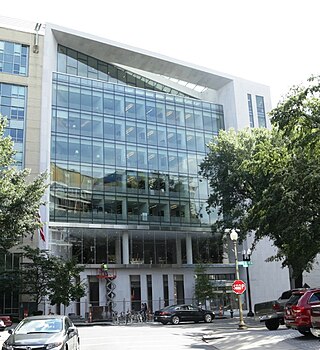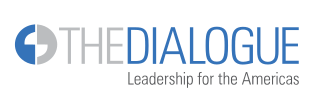
A think tank, or policy institute, is a research institute that performs research and advocacy concerning topics such as social policy, political strategy, economics, military, technology, and culture. Most think tanks are non-governmental organizations, but some are semi-autonomous agencies within government or are associated with particular political parties, businesses or the military. Think-tanks are often funded by individual donations, with many also accepting government grants.

The American Enterprise Institute for Public Policy Research, known simply as the American Enterprise Institute (AEI), is a center-right think tank based in Washington, D.C., that researches government, politics, economics, and social welfare. AEI is an independent nonprofit organization supported primarily by contributions from foundations, corporations, and individuals. Founded in 1938, the organization is aligned with conservatism and neoconservatism but does not support political candidates. AEI advocates in favor of private enterprise, limited government, and democratic capitalism. Some of their positions have attracted controversy, including their defense policy recommendations for the Iraq War, their analysis of the financial crisis of 2007–2008, and their energy and environmental policies based on their more than two-decade-long opposition to the prevailing scientific opinion on climate change. AEI is governed by a 28-member Board of Trustees. Approximately 185 authors are associated with AEI. Arthur C. Brooks served as president of AEI from January 2009 through July 1, 2019. He was succeeded by Robert Doar.
The Heritage Foundation is an American conservative think tank based in Washington, D.C. The foundation took a leading role in the conservative movement during the presidency of Ronald Reagan, whose policies were taken from Heritage's policy study Mandate for Leadership.

The Brookings Institution, often stylized as Brookings, is an American think tank that conducts research and education in the social sciences, primarily in economics, metropolitan policy, governance, foreign policy, global economy, and economic development.
New America, formerly the New America Foundation, is a think tank in the United States founded in 1999. It focuses on a range of public policy issues, including national security studies, technology, asset building, health, gender, energy, education, and the economy. The organization is based in Washington, D.C., and Oakland, California. Anne-Marie Slaughter is the chief executive officer (CEO) of the think tank.

The Center for American Progress (CAP) is a public policy research and advocacy organization which presents a liberal viewpoint on economic and social issues. It has its headquarters in Washington, D.C.

The Carnegie Endowment for International Peace (CEIP) is a nonpartisan international affairs think tank headquartered in Washington D.C., with operations in Europe, South and East Asia, and the Middle East as well as the United States. Founded in 1910 by Andrew Carnegie, the organization describes itself as being dedicated to advancing cooperation between countries, reducing global conflict, and promoting active international engagement between the United States and countries around the world. It engages leaders from multiple sectors and across the political spectrum.

The Center for Strategic and International Studies (CSIS) is an American think tank based in Washington, D.C. From its founding in 1962 until 1987, it was an affiliate of Georgetown University, initially named the Center for Strategic and International Studies of Georgetown University. The center conducts policy studies and strategic analyses of political, economic and security issues throughout the world, with a focus on issues concerning international relations, trade, technology, finance, energy and geostrategy.

The Competitive Enterprise Institute (CEI) is a non-profit libertarian think tank founded by the political writer Fred L. Smith Jr. on March 9, 1984, in Washington, D.C., to advance principles of limited government, free enterprise, and individual liberty. CEI focuses on a number of regulatory policy issues, including business and finance, labor, technology and telecommunications, transportation, food and drug regulation, and energy and environment in which they have promoted climate change denial. Kent Lassman is the current President and CEO.
The Peterson Institute for International Economics (PIIE), known until 2006 as the Institute for International Economics (IIE), is an American think tank based in Washington, D.C. It was founded by C. Fred Bergsten in 1981 and has been led by Adam S. Posen since 2013. The institute conducts research, provides policy recommendations, and publishes books and articles on a wide range of topics related to the US economy and international economics.
The Mercatus Center is an American libertarian, free-market-oriented non-profit think tank. The Mercatus Center is located at the George Mason University campus, however the organization is privately funded and its employees are independent of the university. It is directed by Daniel M. Rothschild and its board is chaired by American economist Tyler Cowen. The Center works with policy experts, lobbyists, and government officials to connect academic learning with real-world practice. Taking its name from the Latin word for market, the center advocates free-market approaches to public policy. During the George W. Bush administration's campaign to reduce government regulation, The Wall Street Journal reported, "14 of the 23 rules the White House chose for its 'hit list' to eliminate or modify were Mercatus entries".

The Inter-American Dialogue, also known as the Dialogue or IAD, is a U.S.-based think tank in the field of international affairs primarily related to the Western Hemisphere. Headquartered in Washington, D.C it intends to "foster democratic governance, prosperity, and social equity in Latin America and the Caribbean". The Dialogue's research areas focus on the rule of law, education, migration, remittances, energy, climate change and extractive industries.
The Columbia Institute for Tele-Information (CITI) is one of several research centers for Columbia Business School, focusing on strategy, management, and policy issues in telecommunications, computing, and electronic mass media. It aims to address the large and dynamic telecommunications and media industry that has expanded horizontally and vertically drive by technology, entrepreneurship and policy.
The America Creating Opportunities to Meaningfully Promote Excellence in Technology, Education, and Science Act of 2007, also known as the America COMPETES Act, was authored by Bart Gordon and signed into law on August 9, 2007, by President George W. Bush. The act aimed to invest in innovation through research and development and improve the competitiveness of the United States.

Robert David Atkinson is a Canadian-American economist. He is president of the Information Technology and Innovation Foundation (ITIF), a public policy think tank based in Washington, D.C., that promotes policies based on innovation economics. He was previously Vice President of the Progressive Policy Institute.

Manufacturing is a vital economic sector in the United States. The United States is the world's third largest manufacturer with a record high real output in Q1 2018 of $2.00 trillion well above the 2007 peak before the Great Recession of $1.95 trillion. The U.S. manufacturing industry employed 12.35 million people in December 2016 and 12.56 million in December 2017, an increase of 207,000 or 1.7%. Though still a large part of the US economy, in Q1 2018 manufacturing contributed less to GDP than the 'Finance, insurance, real estate, rental, and leasing' sector, the 'Government' sector, or 'Professional and business services' sector.

The PROTECT IP Act was a proposed law with the stated goal of giving the US government and copyright holders additional tools to curb access to "rogue websites dedicated to the sale of infringing or counterfeit goods", especially those registered outside the U.S. The bill was introduced on May 12, 2011, by Senator Patrick Leahy (D-VT) and 11 bipartisan co-sponsors. The Congressional Budget Office estimated that implementation of the bill would cost the federal government $47 million through 2016, to cover enforcement costs and the hiring and training of 22 new special agents and 26 support staff. The Senate Judiciary Committee passed the bill, but Senator Ron Wyden (D-OR) placed a hold on it.

Sascha Meinrath holds the Palmer Chair in Telecommunications at Penn State University. He is the founder of X-Lab, a future-focused technology policy and innovation think tank, and promotes the "Internet in a Suitcase" effort to create ad hoc mesh wireless technologies. Meinrath founded the Open Technology Institute in 2008 and directed the Institute while also serving as Vice President of the New America Foundation. He is also the co-founder and executive director of the CUWiN Foundation, a non-profit launched in 2000 that aims to develop "decentralized, community-owned networks that foster democratic cultures and local content," and in 2007 founded the Open Source Wireless Coalition, "a global partnership of open source wireless integrators, researchers, implementors and companies dedicated to the development of open source, interoperable, low-cost wireless network technologies." In 2012 he was elected as an Ashoka Global Fellow for leading support for Internet freedom in the United States and around the globe, as well as named to Newsweek's Digital Power Index Top 100 influencers among other “public servants defining digital regulatory boundaries” for his efforts to develop open-source, low-cost community wireless networks and his role in fighting Stop Online Piracy Act (SOPA) and the Protect IP Act (PIPA). In 2013 Time named Meinrath to the TIME Tech 40: The Most Influential Minds in Tech for his work to protect Internet freedom.

Manufacturing USA, previously known as the National Network for Manufacturing Innovation, is a network of research institutes in the United States that focuses on developing manufacturing technologies through public-private partnerships among U.S. industry, universities, and federal government agencies. Modeled similar to Germany's Fraunhofer Institutes, the network currently consists of 16 institutes. The institutes work independently and together on a number of advanced technologies.

William Boone Bonvillian, a Fellow of the American Association for the Advancement of Science (AAAS), is a specialist on innovation and technology policy. He is a Lecturer at the Massachusetts Institute of Technology (MIT), teaching innovation policy courses in the departments of Science, Technology and Society and Political Science, and serves as a Senior Director for special projects at MIT Open Learning researching workforce education. He was named Fellow of the American Association for the Advancement of Science for his work in 2011, and he received the IEEE's award for distinguished public service in 2006.












